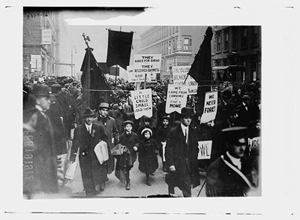This Month in Labor History: The story behind ‘Bread & Roses’
January 1, 1970
In honor of national poetry month we’re bringing you the history of the term “Bread & Roses,” which was coined in 1912 by labor union leader Rose Schneiderman (April 6, 1882 – August 11, 1972) in a speech to textile strikers in Lawrence, Massachusetts:
"What the woman who labors wants is the right to live, not simply exist — the right to life as the rich woman has the right to life, and the sun and music and art. You have nothing that the humblest worker has not a right to have also. The worker must have bread, but she must have roses, too. Help, you women of privilege, give her the ballot to fight with."
Inspired by this speech, James Oppenheim wrote the poem “Bread and Roses”, which came to be associated with the Lawrence strike so closely that it’s commonly referred to as the Bread and Roses strike. After two, cold, hungry months of strike, the workers won, causing a ripple effect through the textile industry as mill owners all over the country improved working conditions to avoid a strike like the one in Lawrence.
To learn about 1199SEIU’s Bread & Roses Cultural Project, click here.


